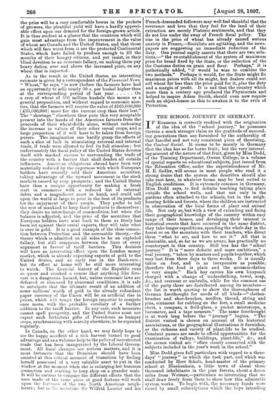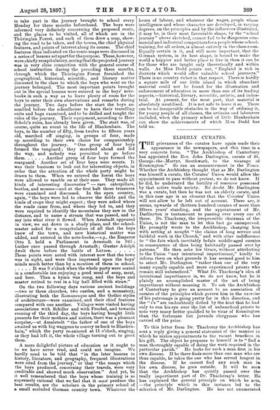THE SCHOOL JOURNEY IN GERMANY.
IF Rousseau is correctly credited with the origination of the idea of the ‘1 school journey," he possesses therein a much stronger claim on the gratitude of succeed- ing generations than any furnished by the authorship of that fanciful and not very consistent piece of theorising, the Contrat Social. It seems to be mainly in Germany that the idea has so far borne fruit; but the very interest- ing account of the nature of that fruit, given by Miss Dodd, of the Training Department, Owens College, in a volume of special reports on educational subjects, just issued from the Education Office, under the superintendence of Mr. M. E. Sadler, will arouse in most people who read it a strong desire that the system she describes should also take root here, in whatever forms may be best suited to English conditions. It is extremely common in Germany, Miss Dodd says, to find definite teaching taking place outside the school walls, and that not only in the gardens often attached to the schools, but in the neigh- bouring fields and forests, where the children are instructed in observation of the local forms of plant and animal life. Not only so, but with a view of extending and fixing their geographical knowledge of the country within easy range of their homes, and developing their interest in historical events that have occurred in the same district, they take longer expeditions, spending the whole day in the forest or on the mountain with their teachers, who direct them "what to see, and how to see it." All that is admirable, and, so far as we are aware, has practically no counterpart in this country. Still less has the "school journey." It is "more definite and more ambitious," a real journey, "taken by masters and pupils together, which may last from three days to three weeks. It is usually taken on foot, and is as inexpensive as possible; therefore the food is plain and the accommodation is very simple." Each boy carries his own knapsack charged with a change of underclothing, towel, soap, &c., and overcoat or umbrella, while for the common use of the party there are distributed among its members— the list is worth quoting to show the thoroughness of German forethought for needs of all kinds—" clothes- brushes and shoe-brushes, needles, thread, string and pins, ointment for rubbing on the feet, a small medicine chest, a compass, a field-glass, a pocket microscope, a barometer, and a tape measure." The same forethought is at work long before the " journey " begins. "The district visited is chosen on account of its historical associations, or the geographical illustrations it furnishes, or the richness and variety of plant-life to be studied. Constant pauses are made to afford opportunities for the examination of valleys, buildings, plant-life," &c., and the scenes visited are "often closely connected with the subjects included in the year's work in the school."
Miss Dodd gives full particulars with regard to a three. days' "journey" in which she took part, and which wa.i conducted by Herr Scholz, head-master of the primary school at Blankenhain, a little town of about three thousand inhabitants in the pine forests, about a dozen miles from Weimar,—particulars so interesting that we shall draw freely from them to show how this admirable system works. To begin with, the necessary funds were raised by small_subscriptions which the boys intending to take part in the journey brought to school every Monday for three months beforehand. The boys were informed very definitely concerning the proposed route, and the places to be visited, all of which are in the Thilringian Forest, and each of them drew a map, show- ing the road to be taken, and the towns, the chief physical features, and points of interest along its course. The chief features thus indicated on the route-maps were discussed in a series of lessons set apartfor the purpose. These, however, were chiefly recapitulatory, seein g that the projected journey was in very close connection with the general course of school instruction during the preceding three months, through which the Thuringian Forest furnished the geographical, historical, scientific, and literary matter discussed in the class to which the boys who went on the journey belonged. The most important points brought out in the special lessons were entered. in the boys' note- books in such a way as to leave plenty of room for the boys to enter their own observations and remarks during the journey. Two days before the start the boys as- sembled before the schoolhouse to have their travelling suits and bags examined, and to be drilled and taught the rules of the journey. Their equipment, according to Herr Scholz's rules, has already been given. The start was, of course, quite an event in the life of Blankenhain. The boys, to the number of fifty, from twelve to fifteen years old, marched off singing, in groups of four, made up according to their own choice for companionship throughout the journey. "One group of four boys formed the vanguard ; they marched ahead and led the way, and nobody was permitted to go before them Another group of four boys formed the rearguard. Another set of four boys were scouts. It was their business to look out for interesting objects, in order that the attention of the whole party might be drawn to them. When we entered the forest the boys were allowed to ramble on at their ease. They made all kinds of interesting discoveries" — rare caterpillars, beetles, and mosses—and at the first halt these treasures were examined and discussed. In the open country, again, "the boys were led to observe the fields and the kinds of crops they might expect ; they were asked where the roads came from, and where they led to, and they were required to identify the mountains they saw in the distance, and to name a stream that was passed, and to say into what river it flowed. When Arnstadt appeared in view, we sat down in a shady place, and the school- master asked for a recapitulation of all that the boys knew of the town, and new historical matter was added, and entered in the note-books,—e.g., the Emperor Otto L held a Parliament in Arnstadt in 945; Luther once passed through Arnstadt; Gustav Adolph dwelt there before the battle of Liitzen These points were noted with interest now that the town was in sight, and were thus impressed upon the boys' minds much better than by a mention of them in school. It was 9 o'clock when the whole party were seated in a comfortable inn enjoying a good meal of soup, meat, and beer. Then a hymn was sung, and the boys and master retired to rest in a big hall filled with straw."
On the two following days various ancient buildings —two or three churches, two castles, and a monastery, illustrating both the Romanesque and the Gothic styles of architecture—were examined, and their chief features compared with one another. Villages were visited having associations with Schiller and with Froebel, and towards evening of the third day, the boys having bought little presents for their mothers and sisters, there was a pleasant surprise,—at Amalstedt "the father of one of the boys awaited us with big waggons to convey us back to Blanken- hain," which the party re-entered at 11 o'clock, singing, as they had left it, the whole village turning out to greet them.
A more delightful picture of education as it ought to be we have never read, and could not imagine. We hardly need to be told that "in the later lessons in history, literature, and geography, frequent illustrations were cited from the journey," or that "the essays which the .boys produced, concerning their travels, were very creditable and showed much observation." And yet, be it well remembered that the boys whose training is so supremely rational that we feel that it must produce the best results, are the scholars in the primary school of a small secluded German country town. Whatever the hours of labour, and whatever the wages, people whose intelligence and whose character are developed, in varying degrees, on the principles and by the influences illustrated, it may be, in their most favourable shape, by the "school journey" above sketched, cannot fail to be dangerous com- mercial and industrial competitors fora people whose school- training, for all orders, is almost entirely in the class-room. Equally certain is it, and still more important, that the German system, in its best shape, is bound to make the world a happier and better place to live in than it can be for those who are taught only theoretically and within walls. As Miss Dodd points out, "England is rich in districts which would offer valuable school journeys." There is no country richer in that respect. There is hardly a square mile of our little island in which abundant material could not be found for the illustration and enforcement of education in more than one of its leading aspects,—historical, literary, scientific, artistic, and indus- trial. At present, for the most part, that material is absolutely unutilised. It is not safe to leave it so. There can be no insuperable obstacles in the way of utilising it, for young people of all classes, the artisans and labourers included, when the primary school of little Blankenhain can show the achievements of which Miss Dodd haa told us.



































 Previous page
Previous page